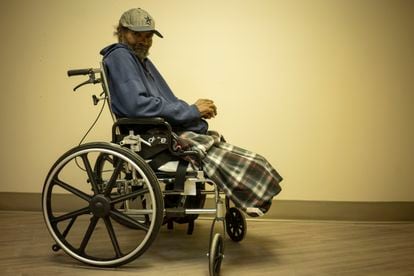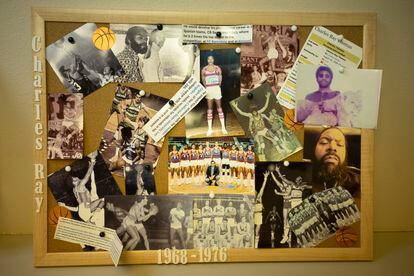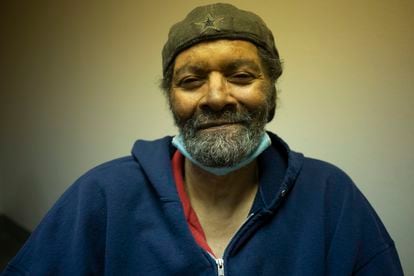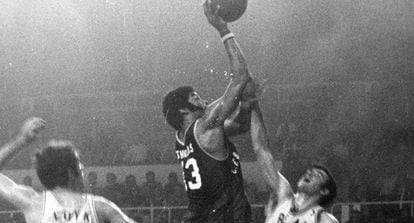Former Barcelona basketball star Charles Thomas located in Texas after being given up for dead in the early 1980s
The player, known as ‘The Black Panther’ in Spain, was rumored to have died in a fight or from an overdose. EL PAÍS meets the trailblazer in a home in Texas, after his unexpected reappearance

To the media, he was “The Black Panther.” In the 1970s, there were very few African-American players in the Spanish Basketball League (ACB) and even rarer were players capable of the feline agility of Charles Thomas, whose jump was unmatchable. A center standing at just over two meters tall, he was traded from Sant Josep in 1971 after finishing as the league’s top scorer in the previous two seasons and established himself as one of the stars of the Barcelona team of the first half of the 1970s. However, a serious knee injury suffered during a game against Real Madrid in November 1974 signaled the beginning of Thomas’s downfall. The Black Panther no longer leaped as he had done before. He sought escape and solace. One of the most recognizable faces in Spanish basketball became a ghost.
Forty years ago, Thomas disappeared, leaving behind family, friends and a kit bag of unanswered questions, blame, frustration and doubt. The last trace of Thomas was in the early 1980s when rumors abounded that he had died during a fight in New York, or of an overdose in a Mexican alleyway. The giant center was long believed dead, his Wikipedia page recording his date of birth as August 23, 1946, with the addendum: “He is believed to have died in the early 1980s, although this is not certain.”
A couple of weeks ago, that entry was updated. Norman Carmichael, a former teammate at Barça, had received a call from a center for people with disabilities in Amarillo, Texas. Far from being dead, The Black Panther was eating soup in an old folks’ home.
“I was in the car with my family. My son was driving and the phone rang,” Carmichael told Catalan radio station RAC1. “My wife told me Charles Thomas wanted to speak to me. I told her it must be a joke, that Charles had died years ago. But we turned on a video call. I thought maybe it was a friend of his trying to pull the wool, maybe to try and get money out of me. But as we were talking, I realized he knew too much to be an imposter. It’s amazing, it’s like something out of a movie.”
Seated in a wheelchair with a tartan blanket over his legs Thomas, now 74, spoke to EL PAÍS in his first interview since his resurrection. “My friend told me all these stories about how I was dead… people like to talk about stuff. I have never been into drugs. All I ever did was smoke cigarettes,” he says.
– Why did you wait so long to let someone know you were alive?
– I went out for a walk, but now I’m back.
Thomas’s walk was a long and arduous one. During the interview, he lifts the blanket covering his legs to reveal two stumps below his knees. “It was because of the cold,” he explains. Winter in Texas can last for five months and Thomas spent many years on the streets. “It’s like living inside a refrigerator. You feel as if your legs are blocks of ice.” Things got worse when he trod on a rusty nail while working as a carpenter, fixing roofs. He says that the doctors who amputated his legs told him it was due to “rusty nail disease.”
– Did you ever dream of playing basketball again?
– Sometimes. But since I broke my knee, I never dreamed that I would jump again.
Thomas speaks slowly and from time to time he drops in a word in the Spanish that he learned during his 10 years in the country. When he says “rodilla” [knee] he apologizes for not being able to form the rolling “r” sound. “I’ve lost a few teeth along the way,” he says, but he can’t remember when. He also can’t remember for how many years he was homeless.
To try and determine when he lost his legs he asks when Pope John Paul II died: “2005?”. Since then, he has been a resident at the clinic in Amarillo, thanks to a disability subsidy. The story of how he got here is full of gaps. Thomas recounts how he returned to the United States from Spain but was stuck in a New York airport “because I’d lost my ID.” He also talks about various stints in Los Angeles jails. “Two days,” “a week,” “three months.” When he arrived back in Texas he stayed with a cousin in Uvalde, the small town where he was born, went down to Mexico, then returned to Texas.
– Were you in touch with your family during these 40 years?
– At the beginning. After that, I crossed the divide where nobody helps nobody.

“Have you got Clifford Luyk’s number?”
During the game that changed everything in 1974, Thomas’s opposite number was Clifford Luyk, a Real Madrid legend who won 14 ACB titles and six European Cups during his 16-season career with the team. The first half was still in play when Thomas received the ball. He feinted and marked his steps to the hoop. But Luyk did not fall for the ruse and pressed in. At the moment of Thomas’s jump, the fateful collision took place, knee smashing into knee. Thomas’s patellar tendon snapped like a twig.
“If I hadn’t made the jump I wouldn’t have got injured, but I wasn’t afraid. If I could go back, I wouldn’t do it again,” Thomas says. He holds no grudge against Luyk. “It happens in sport.” He would, though, like the opportunity to talk to Luyk about the old days. “I wish I could give him a call. Have you got Clifford Luyk’s number?” he inquires.
On the wall in the room the clinic has provided for the interview, there is a corkboard with newspaper clippings of the era. Luyk is not among them but another legendary Real Madrid player, Juan Antonio Corbalán, is. There are photographs of Thomas with Sant Josep, his first Spanish team, and with Barcelona. In one, a bearded Thomas, wearing a paisley shirt, looks at the camera next to an elaborately mustachioed man in a turtleneck sweater. They look like Starsky and Hutch. The mustache belongs to Norman Carmichael, the second of Barcelona’s American centers of the era, who Thomas called two weeks ago to announce that he was still alive.

After his knee injury, Thomas spent a year out of the game and was traded to Manresa ahead of the 1975-76 season: a change of team, of city and of friendships. He never felt himself on court again and he started to spend more time with a military friend who introduced him to Catalonia’s nightlife. Thomas’s wife left him and took his son with her.
– How did you feel at that time?
– Something inside me broke. And it wasn’t just the knee.
“I ran up against the law”
When his contract at Manresa expired his debts started to pile up. He was forced to ask for loans from friends. “It was humiliating. It hurt my pride because I’d been a star. It was as if Michael Jordan or Kareem Abdul-Jabbar were asking for money.” He decided to go back to the US. “I wanted things to calm down a bit. But I ran up against the law. It was the police’s fault. They are abusive toward African-Americans and things got complicated when I got out of jail.”
He found work where he could: as a waiter, a shelf-stacker, a carpenter. The Black Panther, whose photogenic slam dunks had earned him millions of pesetas in Spain, was now earning $15 (€12.70) a day. “I couldn’t stand it,” he says, pulling down his baseball cap over his face.
His friend Carmichael, who waited a couple of weeks before going public with the news that his former teammate is still alive, describes him as a “big kid,” blessed with natural talent but not overly zealous about training. “He told me once that he was a player born with a predetermined number of jumps in him. He didn’t want to waste them on the practice court.”
Thomas’s viewpoint was not altered by the arrival at Barcelona of Serbian coach Ranko Zeravica in 1974, who preferred young, homegrown talent over star foreign players. During his three seasons, he paved the way for the legendary team of Epi, Solazábal, Sibilio and De la Cruz.
Thomas admits Carmichael had him pegged. “The Yugoslavian coach treated us like robots. I learned to play on the courts in my neighborhood. I didn’t like the whole thing of training twice a day at all. Morning and afternoon. You have to pace yourself. The body has a sell-by date.”
Thomas’ reserve of jumps was exhausted before its time, in a nod to Marlene Dietrich’s famous line in Orson Welles’ film noir classic Touch of Evil, set in the frontier town of Ciudad Juárez, a place of sin and perdition used by so many Americans as an escape route, from John Wayne to Charles Mingus and Thomas himself. When Welles’ corrupt and tormented policeman Hank Quinlan asks Dietrich’s fortune teller to read his future, she tells him: “You haven’t got any. Your future’s all used up.”

The prodigal grandfather
During the interview, Thomas’s cellphone buzzes. It is his son, Carlos. The last time he saw his father he was not yet 10 years old and was living with his mother, Linda, in Barcelona. Carlos had moved on, assuming Thomas had died in New York or Mexico as the rumors suggested.
Today Carlos is in his 50s and lives with his wife and daughter in Oakland. When he was told his father was still alive he thought it was a scam. Carmichael assured him Thomas was no imposter. Carlos decided to make the call. “He nearly had a heart attack,” says Thomas with a half-smile, somewhere between mischief and pent-up emotion. The Black Panther found out he is a grandfather. Now Carlos is hoping he and his daughter can make the 1,363-mile trip to Amarillo when they have received their Covid-19 vaccinations.
Thomas remains philosophical about his 40-year disappearance. When he was living on the streets, he found solace in the Bible. “My surname is the same as the apostle Thomas, who nobody knows if he really existed or not. Maybe because of that I became a ghost,” he muses, rubbing his beard.

English version by Rob Train.
More information


/cloudfront-eu-central-1.images.arcpublishing.com/prisa/BDSALIUEWZGRJJHDY5C6XHDUAI.JPG)










































